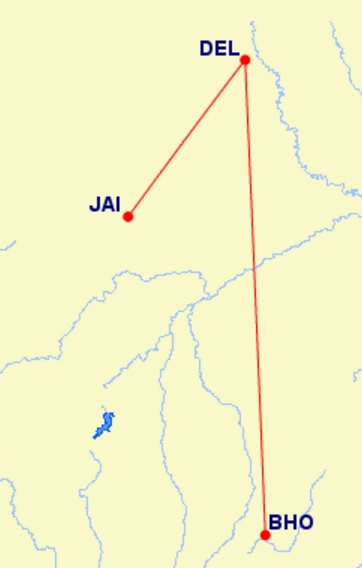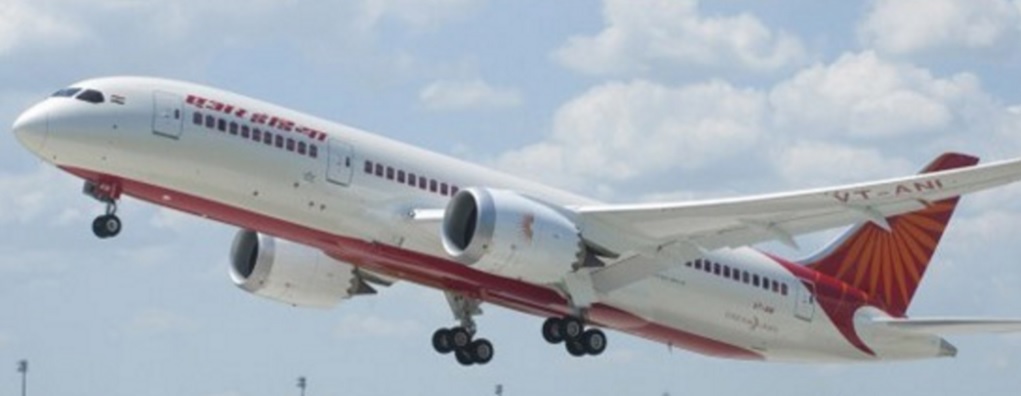Air India’s flight AI436 from Bhopal to Delhi experienced a bird strike on departure from Bhopal. The captain of the Airbus A319 decided to make the 364 mile flight instead of turning around or diverting.
Making sense of news coverage of aviation-related events is tough, because so much of what’s reported in the mainstream press about airline incidents is wrong.
The way the story is pitched it sounds as though the plane reached its destination but was denied permission to land as some sort of punishment for failing to follow proper procedure (!), and sent to an alternate airport.
That does not appear to me to be the case, it’s possible the flight was denied permission to continue to Delhi, and ordered to land in Jaipur which was a closer airport.
Here you can see the relative distances:

And in fact AvHerald reports the diversion was due to weather in Delhi while the aircraft was low on fuel due to a fuel leak.
The crew decided to divert to Jaipur (India) indicating they were diverting due to the adverse weather conditions in Delhi. While on approach to Jaipur the crew reported being low on fuel. The aircraft continued for a safe landing on Jaipur’s runway 27. After landing a fuel leak from one of the engines (CFM56) was detected.
Jaipur Airport reported the crew never mentioned a bird strike. Only on approach the crew requested priority which was immediately provided.
Bird strikes happen all the time, and can be dangerous. But from reports it’s unclear whether the aircraft lost an engine, or lost some of the power to one of the engines. I rarely want to second guess a pilot, certainly without full information. How far into the flight were they when they completed diagnostic procedures? How much more quickly could the plane divert?
I was on a flight that suffered a bird strike for the first time back in October.
As we took off there was a loud noise that came from the right engine, noticeable mostly to those sitting close by. Shortly after the captain comes on, shares that they’re getting vibrations from the engine, and we’d be going back to Dallas.
It was the most direct routing into DFW I’ve ever gotten and I was thrilled once we were safely back on the ground. We stopped short on arrival, received a visual inspection of the engine, and were allowed to proceed to a gate on our own power.
I learned last year that in the event of a bird strike, they investigate the bird.
Pilots in India have something of a reputation for not following procedure. If they want to land on a road, they may just consider landing on a road. They fight each other. If they’re scheduled to fly somewhere they don’t want to go — even for an airline’s inaugural flight — they simply don’t show up.
And if they don’t get assigned their preferred female crew on a trip to the Maldives they’ll refuse to take off until the airline sends her onboard.
Or they’ll declare fuel emergencies so they’ll be allowed priority clearance for landing.

Air India Boeing 787
Of course the passengers sometimes aren’t much better.
I’m just hopeful that wherever I’m flying, the next time the aircraft I’m in starts to lose engine power after a bird strike the captain has the calm demeanor and professionalism of the American Airlines pilot flying me from Dallas to San Francisco in October.


Interesting that your headline is “pilot refuses to divert” rather than “pilot chooses to continue.” It is 100% the captain’s decision to return to the airport or continue the flight.
Have you ever been to Bhopal?
Really Gary? Posting tabloid links with “fake news” rather than an actual story with facts and statements from the parties involved?
http://www.thehindu.com/todays-paper/tp-national/tp-newdelhi/Air-India%E2%80%99s-Bhopal-Delhi-flight-diverted-to-Jaipur-after-bird-hit/article17207327.ece
Like it’s only this field that is affected by today’s mainstream press?
“Making sense of news coverage of aviation-related events is tough, because so much of what’s reported in the mainstream press about airline incidents is wrong.”